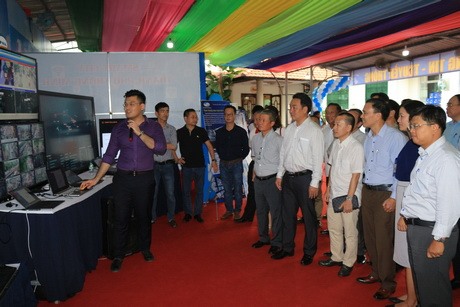The Mekong Delta provinces need to apply advanced technology in agriculture, human resources training, e-government and climate-change adaptation, experts said yesterday at a conference held in Vinh Long Province.

The Mekong Delta provinces need to apply advanced technology in agriculture, human resources training, e-government and climate-change adaptation, experts said yesterday at a conference held in Vinh Long Province.
More than 700 delegates, including representatives from 55 businesses, from the information technology and communication (ICT) sector across the country took part in the 22nd Viet Nam ICT Development conference.
With the theme “Industrial Revolution 4.0 - Opportunities for the Mekong Delta”, the conference focused on building e-government and adapting to climate change under the guidelines and orientation of the Party and State.
Nguyen Thanh Hung, deputy minister of Information and Communications, said the Mekong Delta is the country’s biggest granary and a major economic centre with key products such as seafood, fruit and farm produce.
The region also has great potential for river tourism and the processing industry, he said, adding that some areas have not tapped their potential, including healthcare, education and high-quality human resources.
"The region is facing challenges related to climate change, including rising sea levels and severe salinity. Research and application of IT is inevitable for the country, especially the Mekong Delta,” he told the media.
To take advantage of opportunities in the 4.0 industrial revolution, the PM last year issued a decision on furthering capacity-building to access advanced technologies, he said.
The conference also acts as a forum for policymakers, managers and experts to share experiences and create opportunities for cooperation in the field of ICT.
Nguyen Van Quang, deputy secretary of the provincial Party Committee, who is also chairman of the provincial People’s Committee, said the promotion of IT application helped Vinh Long Province improve administration at all levels and further administrative reform, as well as improve the investment environment.
He said through the event the province was expected to develop guidelines and policies for ICT development, contributing to e-government and climate change adaptation.
The Ministry of Information and Communications now planned to develop a national programme to shift to digitalisation, he said.
“Speeding up the digital transformation process is an important step for Viet Nam to realise opportunities offered by the fourth industrial revolution,” he said.
At the meeting, a representative of the Government Office introduced the e-government building programme in the 2018-20 period with a vision to 2025.
In the past few years, IT development and application in the province has received attention from the Party and State and has been identified as the major task of the entire political system.
To take advantage of and overcome challenges brought about by the digital revolution, besides guidance from the State, the ICT community will play a major role.
On the sidelines of the conference, an ICT exhibition was held with the participation of 24 leading ICT companies.
Other activities included incense offering to the late chairman of the Council of Ministers, Pham Hung, and donation of IT equipment to several units in the province, as well as visits to historical-cultural tourist sites in Vinh Long. — VNS





